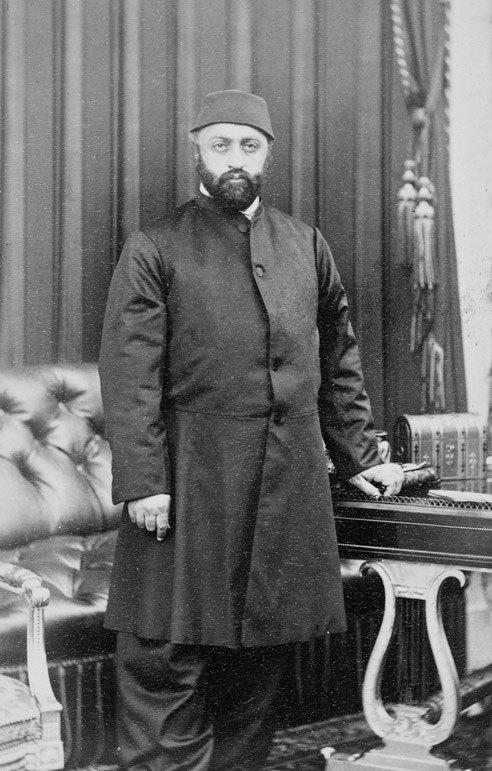The views expressed in our content reflect individual perspectives and do not represent the authoritative views of the Baha'i Faith.
Baha’u’llah, a prisoner of the Ottoman sultan, did not beg for mercy in his tablets to the kings and rulers of the world. Far from flattering the powerful sultan who confined him to prison, Baha’u’llah addressed him in courageous and clear terms:
Beware, O King, that thou gather not around thee such ministers as follow the desires of a corrupt inclination, as have cast behind their backs that which hath been committed into their hands and manifestly betrayed their trust. Be bounteous to others as God hath been bounteous to thee, and abandon not the interests of thy people to the mercy of such ministers as these. Lay not aside the fear of God, and be thou of them that act uprightly. Gather around thee those ministers from whom thou canst perceive the fragrance of faith and of justice, and take thou counsel with them, and choose whatever is best in thy sight, and be of them that act generously.

. . . Take heed that thou resign not the reins of the affairs of thy state into the hands of others, and repose not thy confidence in ministers unworthy of thy trust, and be not of them that live in heedlessness. Shun them whose hearts are turned away from thee, and place not thy confidence in them, and entrust them not with thine affairs and the affairs of such as profess thy faith. Beware that thou allow not the wolf to become the shepherd of God’s flock, and surrender not the fate of His loved ones to the mercy of the malicious. Expect not that they who violate the ordinances of God will be trustworthy or sincere in the faith they profess. Avoid them, and preserve strict guard over thyself, lest their devices and mischief hurt thee. Turn away from them, and fix thy gaze upon God, thy Lord, the All-Glorious, the Most Bountiful. He that giveth up himself wholly to God, God shall, assuredly, be with him; and he that placeth his complete trust in God, God shall, verily, protect him from whatsoever may harm him, and shield him from the wickedness of every evil plotter. . . .
Shouldst thou cause rivers of justice to spread their waters amongst thy subjects, God would surely aid thee with the hosts of the unseen and of the seen, and would strengthen thee in thine affairs. No God is there but Him. All creation and its empire are His. Unto Him return the works of the faithful. . . . Let thine ear be attentive, O King, to the words We have addressed to thee. Let the oppressor desist from his tyranny, and cut off the perpetrators of injustice from among them that profess thy faith. By the righteousness of God! The tribulations We have sustained are such that any pen that recounteth them cannot but be overwhelmed with anguish. No one of them that truly believe and uphold the unity of God can bear the burden of their recital. So great have been Our sufferings that even the eyes of Our enemies have wept over Us, and beyond them those of every discerning person. And to all these trials have We been subjected, in spite of Our action in approaching thee, and in bidding the people to enter beneath thy shadow, that thou mightest be a stronghold unto them that believe in and uphold the unity of God. Have I, O King, ever disobeyed thee? Have I, at any time, transgressed any of thy laws? Can any of thy ministers that represented thee in Iraq produce any proof that can establish My disloyalty to thee? Nay, by Him Who is the Lord of all worlds! Not for one short moment did We rebel against thee, or against any of thy ministers. Never, God willing, shall We revolt against thee, though We be exposed to trials more severe than any We suffered in the past. – Summons of the Lord of Hosts, paragraphs 59, 61, 64, 81-82.
The sultan treated this message from Baha’u’llah with the same disdain as the shah had shown. He was not moved to investigate Baha’u’llah’s case, nor introduce any of the reforms he prescribed.
In another message to one of the sultan’s ministers, Baha’u’llah predicted the sovereign’s imminent overthrow and death. This prediction was well-known to the Baha’is and those who knew them. When it came true, some of the latter group became believers.
Baha’u’llah addressed yet another message to Napoleon III, Emperor of France. His arrogant response is reported to have been, “‘If this man is God, I am two gods.’”- quoted in Shoghi Effendi’s The Promised Day is Come, p. 51. Baha’u’llah sent a second message, this time predicting the emperor’s downfall:
For what thou hast done, thy kingdom shall be thrown into confusion, and thine empire shall pass from thine hands, as a punishment for that which thou hast wrought. Then wilt thou know how thou hast plainly erred. Commotions shall seize all the people in that land, unless thou arisest to help this Cause, and followest Him Who is the Spirit of God [Jesus Christ] in this, the Straight Path. Hath thy pomp made thee proud? By My Life! It shall not endure; nay, it shall soon pass away, unless thou holdest fast by this firm Cord. We see abasement hastening after thee, whilst thou art of the heedless. It behoveth thee when thou hearest His Voice calling from the seat of glory to cast away all that thou possessest, and cry out: “Here am I, O Lord of all that is in heaven and all that is on earth!” – ibid, paragraph 138.
This letter was sent in 1869. Only one year later, in a swift series of events that shocked the whole world, Napoleon suffered humiliating defeat at the hands of the Prussians. He lost his power and would die in exile a few years later. Interestingly, the French agent who translated the tablet and sent it to Napoleon, aware of the promise of doom it contained, became a believer in Baha’u’llah as soon as it was fulfilled.
You May Also Like
Comments

















Your work about Justice entails so many coincidences for me ...as a student of Iran’s monarchy and history and also as a recent visitor to Teheran to hang out with old friends in the Iranian Esperanto movement that I’m compelled as a rank amateur to comment while your President visits my country – coincidentally. Let’s hope and pray that the Prime Minister of Australia, Tony Abbott, refrains from exhibiting his boxing skills and his promise to shirt-front (i.e. in Aussie football slang – assault) President Putin. My comments pertain to all of the above and to my special interest in the Shah cited by you.
"One day, while in Constantinople, [1863] Kamál Páshá [a high ranking Turkish minister at the Ottoman court of Sultan ‘Abdu’l-‘Azíz (1830-1876, r: 1861-1876, abdicated 30th May, murdered five days later)] visited this Wronged One. Our conversation turned upon topics profitable unto man. He said that he had learned several languages. In reply We observed ‘You have wasted your life. It beseemeth you and the other officials of the Government to convene a gathering and choose one of the divers languages, and likewise one of the existing scripts, or else to create a new language and a new script to be taught to children in schools throughout the world. In this way, they would be acquiring only two languages, one their own native tongue, the other the language in which all the peoples of the world would converse. Were men to take fast hold on that which hath been mentioned the whole Earth would come to be regarded as one country and the people would be relieved and freed from the necessity of acquiring and teaching different languages.’ When in Our presence he acquiesced, and even evinced great joy and complete satisfaction. We then told him to lay this matter before the officials and Ministers of the government, in order that it might be put into effect throughout the different countries. However, although he often returned to see Us after this, he never again referred to this subject, although that which had been suggested is conducive to the concord and the unity of the peoples of the world. We fain would hope that the Persian government will adopt it and carry it out. At present, a new language and a new script have been devised. If thou desirest, We will communicate them to thee. Our purpose is that all men may cleave unto that which will reduce unnecessary labour and exertion, so that their days may be befittingly spent and ended. God, verily, is the Helper, the Knower, the Ordainer, the Omniscient."
Bahá’u’lláh, 'The Epistle to the Son of the Wolf'
In my research I found no one asking Him about this newly devised language and script. One year after the publishing in 1891 of ‘The Epistle to the Son of the Wolf’ Bahá’u’lláh ascended, by which date Esperanto as a five year-old had appeared in print in the neighboring Russian empire and from Warsaw had spread much farther abroad. In April 1890, many months before Bahá’u’lláh’s text refers to a newly devised language and script, the famous Cambridge orientalist Professor E. G. Browne was granted several audiences with Him, during which, doctor Zamenhof’s ingenious invention may have come under scrutiny. By its admirers Esperanto is called the planned or devised language while some naysayers pejoratively refer to this planned device - so esteemed by ‘Abdu’l-Bahá, Shoghi Effendi, various Hands of the Cause of God including ace titleholder from America, Martha Root, and perhaps or probably, even by Bahá’u’lláh - as the artificial language.